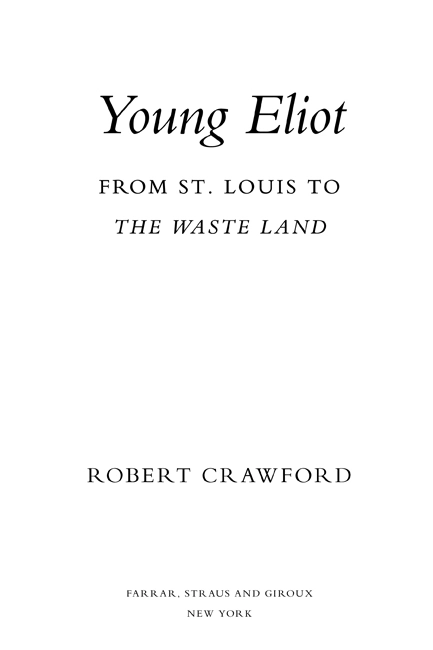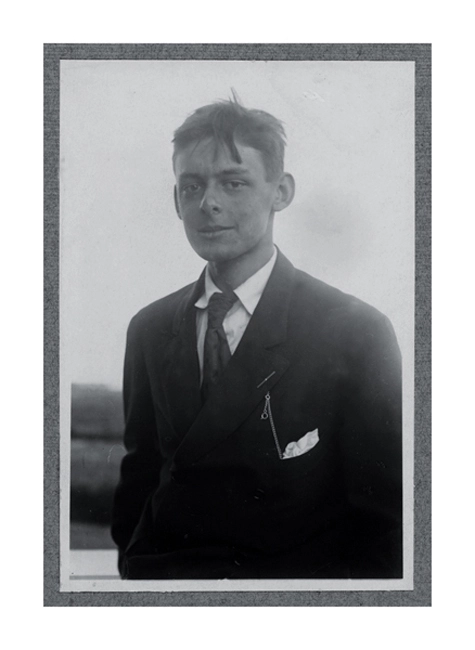Young Eliot

Begin Reading
Table of Contents
About the Author
Photos
Copyright Page
Thank you for buying this
Farrar, Straus and Giroux ebook.
To receive special offers, bonus content,
and info on new releases and other great reads,
sign up for our newsletters.

Or visit us online at
us.macmillan.com/newslettersignup
For email updates on the author, click here.
The author and publisher have provided this e-book to you for your personal use only. You may not make this e-book publicly available in any way. Copyright infringement is against the law. If you believe the copy of this e-book you are reading infringes on the author’s copyright, please notify the publisher at: us.macmillanusa.com/piracy.
for Alice

Introduction
T. S. ELIOT was never young. That, at least, is the impression many readers get from his work. ‘I grow old … I grow old…’ complains the voice of ‘The Love Song of J. Alfred Prufrock’, written when the poet was at the start of his twenties. A few years later Eliot began another poem with the words ‘Here I am, an old man’. Still in his early thirties when he published The Waste Land in 1922, he argued that the ‘most important personage in the poem’ was Tiresias, who has already ‘foresuffered all’ and appears to have lived for thousands of years.1
Yet Eliot knew what it meant to be young. To follow his development from early childhood enhances alike reading of his work and understanding of his life. Presenting him as shy, sometimes naïve and vulnerable, Young Eliot aims to unsettle common assumptions about this poet’s perceived coldness. It shows how his American upbringing combined with experience of France and England to make him not only the most remarkable immigrant poet in the English language but also the most influential and resounding poetic voice of the twentieth century. His poetry embodies an almost limitless resonance.
Eliot’s youth remained vital even to his ‘aged eagle’ tone and achievement.2 Several people who knew him intimately recognised this. His widow Valerie, who died in 2012, maintained that there remained always a ‘little boy’ inside ‘Tom’.3 His nephew Graham Bruce Fletcher remembers being taken in boyhood by Uncle Tom to a London joke shop during the early 1960s to buy stink bombs, which they then let off inside the nearby Bedford Hotel, not far from Eliot’s office; with a fit of hysterical giggles, Eliot put on a marked turn of speed as he and his nephew, Macavity-like, removed themselves from the scene of the crime. ‘Tom’ sped off twirling his walking stick, ‘in the manner of Charlie Chaplin’.4 Back home, they did not tell Valerie what they had been up to. Instead, the septuagenarian business-suited Nobel Prize winner settled down to playing with his nephew’s remote-controlled toy Aston Martin James Bond car. In age, among those whom he trusted most, the poet nicknamed Old Possum retained a certain gleefulness. He remained young Eliot.
This elderly gentleman turned stink-bomber may have been making up for lost time. His own childhood had been unabashedly strict. A shy, big-eared boy whose privileged upbringing took place within earshot of one of the most seductive productions of African American culture – ragtime music – Tom Eliot in St Louis, Missouri, was not a child renowned for wild escapades. Yet just as his first book contains poems that are unsettlingly subversive – in their rhythms, images and social satire – so throughout his life, despite his po-faced, born-venerable public persona, there was an elusive, wounded and sometimes mischievous identity that remained a source of disconcerting creative energy. He once wrote of Alfred Lord Tennyson, the iconic English Victorian Poet Laureate, that he was ‘the most instinctive rebel against the society in which he was the most perfect conformist’.5 The same could be said of the author of The Waste Land.
Like most people to whom his poetry matters, I fell in love with the ineradicably insinuating music of Eliot’s verse. More than forty years after I first read it, there are still things about the poetry that puzzle me, luring me on; but I knew from the start, and writing his biography has confirmed the conviction, that Eliot’s poems work not because they are intellectual games but because they are the products of an intense emotional life fused with a preternatural mastery of the pliancy of language. Like Tennyson and a very small number of other English poets, Eliot had perfect pitch when it came to the music of words. Yet if his hearing was the source of his greatest gift, then, ironically and absurdly, from very early childhood he hated his own ears. Their large size and shape caused him acute embarrassment, deepening his boyhood shyness. What he managed to do was to turn that apparent source of affliction into his greatest artistic asset. Repeatedly, whether in the case of his shy self-consciousness, or his later sense of sexual hurt, or his experience of death, or his raw sense of having made terrible mistakes in his life, Eliot faces up to a wound, a humiliating source of pain, and, through confronting it, incorporates it into an emotionally resonant, brilliantly intelligent work of art.
1 comment